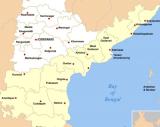New Delhi, Jul 26: Congress tonight gave clear signals about moving close to formation of Telangana state out of Andhra Pradesh, saying the consultation process is over and a decision should be awaited.
The indications came after a two-hour Congress Core Group meeting, chaired by Sonia Gandhi and attended by Prime Minister Manmohan Singh and other senior leaders. The meeting capped a day of hectic deliberations involving party leaders and Andhra Chief Minister Kirankumar Reddy.
"The consultation process is over. Now await the decision of the party as well as UPA government," AICC in-charge of Andhra Pradesh Digvijay Singh told reporters after the Core Group meeting which was also attended by ministers A K Antony, P Chidambaram, Sushilkumar Shinde and Ghulam Nabi Azad.
Earlier, Digvijay Singh held three-hour long discussions with various leaders of Andhra Pradesh, including the Chief Minister.
Sources said in their separate meetings, the Chief Minister, state Congress chief and the deputy Chief Minister have made detailed presentations Digvijay Singh.
After that he said, "The process of consultation is over. And the time to take a decision has come... We will let you know the decision."
PCC chief Botsa Satyanarayana and Deputy Chief Minister Damodar Rajanarasimha were among those with whom Singh held consultations today at the Congress 'War Room' here.
Leaders belonging to both pro and anti-Telangana factions are in the capital to build pressure on the central leadership.
Recently Singh had submitted a report on the issue to Congress President Sonia Gandhi.
The Congress Core Group had discussed the Telangana issue earlier this month and decided to refer the long-pending matter to the Congress Working Committee for a final view.
Amid talk that Congress leadership may take a decision in favour of separate Telangana, a ruling Congress MLA and two YSR Congress legislators from non-Telangana regions said in Hyderabad yesterday that they have "resigned" from their posts in support of the united Andhra Pradesh cause.





Comments
Add new comment